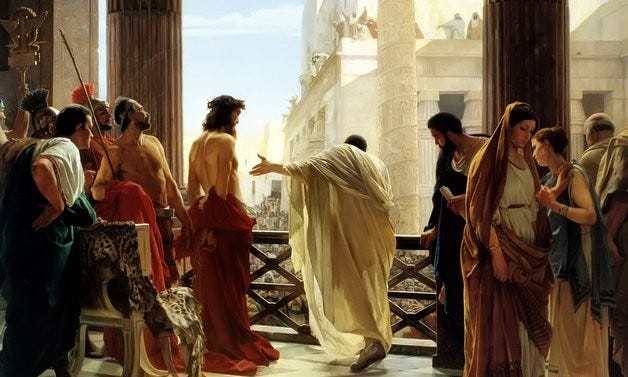During the mass readings for Palm Sunday, I was overwhelmed by thoughts and ideas that came to my mind as we read the Passion narrative in the Gospel. This week I will share a few of those thoughts in a series of articles on my blog.
I usually don’t like this Gospel reading in the mass very much because I always feel awkward reciting the parts spoken by the crowd. I don’t like saying things like “Crucify him!” or “He deserves to die .”But the truth is we always say those things with our actions every time we choose to sin. And it further demands a reflection on this question: In a life that reflects the Gospel today, are we Judas, Saint Peter, or Saint John the Evangelist? How are they different, and why does it matter?
John had pure and innocent faith. He was the only Apostle who followed Jesus to his crucifixion. But he, with the other Apostles, also ran away at Gethsemane when Jesus was arrested. Do we do the same in our lives?
Peter often comes off like a bumbling idiot in the Gospels. His faith is strong but imperfect and sometimes faulty. At times he resists Jesus’ direction. One example: When Jesus told Peter that he would have to go to Jerusalem to suffer and die, Peter responded by saying he won’t allow it. But Peter’s ultimate flub was his three denials of Christ.
Then we come to Judas Iscariot. That’s where I’ll focus in this article., especially in contrast to Peter.

Apostolic Disharmony
Judas
We all know Judas as the betrayer. But St. Peter denied Jesus three times. Isn’t that also a betrayal? I’d say it is, of sorts. But then why does Jesus say of his betrayer, “It’d be better for him had he never been born,” but makes Peter the rock on which Jesus will build His Church? The short answer is that Judas made a choice to pursue his evil, while Peter merely made a mistake. The former was corrupt, while the latter was merely imperfect.
“One of the Twelve, who was called Judas Iscariot, went to the chief priests and said, ‘What are you willing to give me if I had him over to you?’”
Judas did not come face to face with temptation as Peter did. Judas pursued his evil ambition. He “went to the chief priests .” They apparently did not go to him first. He was also very specific about what he was willing to do, “…if I hand him over to you”. He doesn’t offer to spy or to provide inside information; he doesn’t offer to manipulate the other Apostles away from Jesus. He very specifically offers to hand Jesus over to them. It’s not a minor betrayal but an absolute one.
Peter
On the other hand, Peter does not pursue an opportunity to betray Jesus. He also doesn’t betray Jesus for any material gain. It’s also telling that Peter did not go into hiding after Jesus’ arrest but was, up to now, “following Jesus at a distance.”
“Those who had arrested Jesus led him away to Caiaphas, the High priest…Peter was following him at a distance…” and “Now Peter was sitting outside in the courtyard…”.
Peter is not close, but he is nearby. He is following, but he isn’t keeping up. So we see here a strong but imperfect discipleship. Sound like something familiar to your own life?
When some people recognize Peter as one of the Apostles of Jesus, Peter denies it, ultimately saying, “I do not know the man .” It’s a pretty strong denial, especially considering that earlier in the Gospel, it was Peter who said to Jesus, “You are the Christ…” and now he is referring to him as merely a man.
But in the end, we must acknowledge that Peter faltered while Judas chose. Peter tripped along the right path, but Judas walked steadily on the wrong one. And now it comes time to ask ourselves the hard question (Article continues below)
Now, the Hard Question
We have to ask ourselves a very uncomfortable question at this point; a question that’s as uncomfortable as shouting “Crucify him!” in the middle of mass. That question is, “Am I Judas, or am I Peter?” Do you freely choose your sins, or do you merely make mistakes out of human weakness? Are you an intentional betrayer or an accidental one? Do you pursue occasions for sin, or are those occasions introduced to you, putting you to the test? Do you pass the test?
We all sin. We all need mercy. We all need God’s grace in order to change our lives. But sometimes we can be too hard on ourselves. We see ourselves as Judas when we may just be “Peter”; perhaps even John, whose fleeing from Gethsemane was the least of the “betrayals”. On the other hand, some of us see ourselves as John or Peter when an honest examination of our consciences may reveal that we are sometimes more like Judas.
Whoever the Apostle you reflect, always return to Jesus. This is Holy Week, and it’s the perfect time to reboot, refresh, restore, and start again. Go to confession. Then, after you say your penance, sit there and spend some time in silence in front of the Eucharistic Lord. Be with him. And let him be with you. Finally, be most like Saint John by taking Mary as your mother. She will lead you to holiness because she is the quickest path to Her son.


